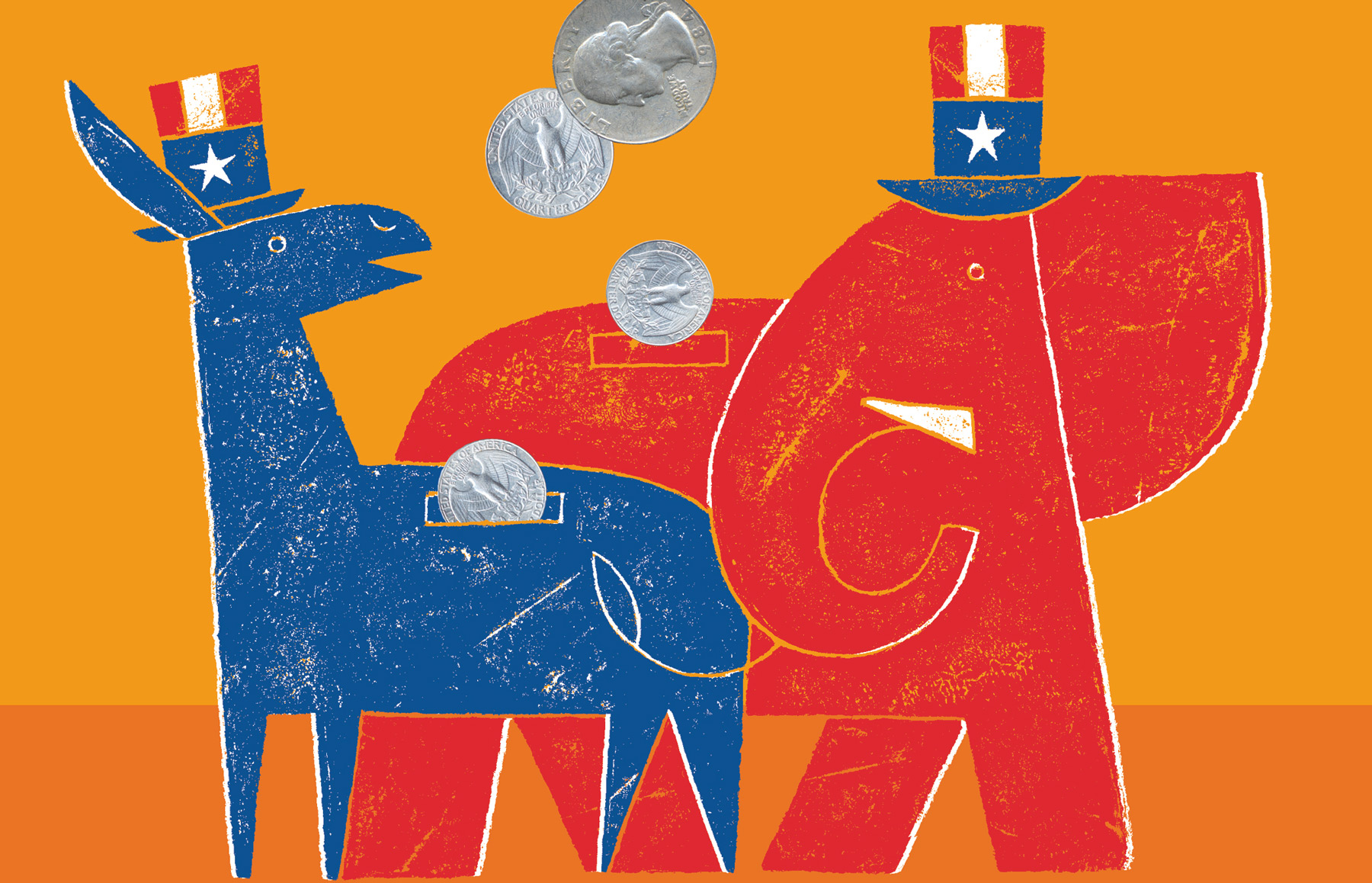Here’s something you can plan on for the next year: uncertainty. The 2016 presidential election will surely rile financial markets. In fact, it already has.
This past fall, biotech stocks lost $38 billion in a single day after Democratic frontrunner Hillary Clinton pledged to cap prescription drug bills for the chronically ill at $250 per month. Other pledges and proposals will surely follow from candidates on both sides, and markets will climb and cascade in response. Add to that China’s sputtering industrial engine and Europe’s stalled economy, and the ride should be even more bumpy before a new occupant claims the keys to the White House.
As The Year of Uncertainty begins, we asked some of Dallas’ best financial planners for advice on how best to keep your financial house in order. Their answers to eight key questions were anything but uncertain.
Questions to Ask No Matter Your Age
Q: Will the presidential election affect my finances if the Republicans win the White House or if the Democrats maintain control?
A: “When you start to move your money around to game an election and when you base your investments on who is in control of the government, it usually does more harm than good over the long run. You can become subject to transaction fees and taxes, for one thing. And you can also put your holdings out of balance where you’re not diversified enough.”
—Scott Schlegel, a Certified Financial Planner with SchlegelDunn in Plano
Q: International and U.S. markets tumbled this year over China’s economic malaise and the slowdown in Europe. Do I need to change my financial plans to adjust for that?
A: “You don’t need to worry about the short-term noise and what’s going on with China. But you do want to make sure your portfolio is properly allocated. You want to figure out whether you want to rebalance your portfolio, buying more of the so-called losers—like investing in emerging markets—and selling the so-called winners—like investments in the United States. It’s an extremely difficult thing to do to buy what’s down—emerging markets, in this case—and sell what is up. But with a long-term investment perspective, volatility is not your enemy.”
—Bryan Lee, Certified Financial Planner and founder of Strategic Financial Planning, Inc. in Plano
Questions for Those in Their 20s and 30s
Q: How do I decide when to hire a financial planner or if I even need one?
A: “Ask yourself this: do you feel confident that you know what questions to ask and where to get the answers to make sure that your financial affairs are in order? Because if you do not, you can end up being one of those people that turns 50, gets that letter from AARP that says you’re now old enough to join, gets depressed for a month, and then says, ‘Hey, I really wish I had started planning my financial future in my 20s.’ ”
—Thomas E. Murphy, CEO of Murphy & Sylvest, a financial planning firm in Dallas
Q: What’s the political outlook in 2016 for student loan relief, and how should I best plan to pay off my loans or my debts in general?
A: “There have been changes to the income-based repayment system that was available. Some loans that had been forgiven after 25 years can now be forgiven after 20 years. And the loan repayment system is open to a larger number of people now. It can change your financial planning approach. Previously, you wanted to find ways to pay off student loans quicker. Now you might pay them off over a longer period if it looks like the payer will qualify for the shorter forgiveness period. But people who think their student loans are going to be gone sooner should not get too excited. The relief you get might be taxed as income. And that might be a significant tax event.”
—Lee
Questions for Those in Their 40s and 50s
Q: Republicans continue to promise challenges to the Affordable Care Act, especially if the party wins the White House. Do I need to adjust my health insurance to prepare for whatever might happen? And are there ways to control health costs over the long term?
A: “Trying to project what will happen with policy changes is something I no longer do. That way leads to madness. I wait now until something actually passes to figure out what it will really mean. Health insurance costs might be 10 percent more or they might be 10 percent less because of a policy change. Big deal. If we’ve done a good plan for a client, no external event should merit a significant change in their financial plan.”
—Murphy
Q: When and how do I re-evaluate my financial plan as my career and finances advance?
A: “You don’t need to make changes based on most current events if you have a long-term investment window. But you should re-evaluate yearly or as changes occur in your life, whether positive or negative. And when things change positively, incorporate it into your plan quickly, before the spending bug gets you.”
—Frances Rutchik Gardner, a Certified Financial Planner at ARMOR Wealth Management in Addison
Questions for Those in Their 60s and Beyond
Q: The Obama administration has proposed changes to long-term IRA payouts and to estate taxes. Do I need to adjust my IRA or estate plan now?
A: “The changes that were made to estate taxes recently have limited estate-tax concerns to a very, very small slice of the population, because the financial thresholds were increased significantly. President Obama has also made some proposals to change the rules for some IRAs, but those are aimed at limiting the size of very large IRAs. There are things to be aware of when it comes to politics and the differences between certain parties on taxes, but we always recommend that clients not rely on any single retirement account. We suggest putting their money in three different buckets. You should have a 401(k) or IRA, a Roth 401(k) or Roth IRA, and a taxable investment account. That way, you’re diversified in terms of different types of investment accounts. And that can limit the impact of any policy changes.”
—Lee
Q: How do I retire and start withdrawing from my accounts when financial markets are so crazy right now?
A: Most people realize the markets are volatile right now, but hopefully they’ve allocated their portfolio appropriately and they have enough cash built up that if they need cash funds—if the markets continue to be volatile—they’ll have enough to handle it. Some of our clients who are approaching retirement even see this as a buying opportunity because the markets have gone down. They know we’re going to keep managing their accounts once they’ve retired. It doesn’t just stop with retirement. I like to keep a year or maybe 18 months of cash in place for my retirees. That may sound severe, but when we have a situation like we’re going through right now, we don’t necessarily have to liquidate anything in their portfolio to fund their cash needs. And we still meet at least once a year, usually twice. We’ll review where we are getting funds from and make sure we’re being prudent.”
—Diana Jenkins, a Certified Financial Planner with Raymond James Financial Services in Dallas
A Checklist of Financial Planning Questions
Questions to ask—and continually re-evaluate—at any age
- At what age do I want to be financially independent?
- How much money do I need to keep my current—or reach my desired—standard of living in retirement?
- How much money do I need to put away each year to get to be financially independent at my desired standard of living?
20s and 30s
- Should I lease or buy a car?
- Should I rent or buy a place to live?
- What is a credit score, and how do I improve it?
- How do I reduce my taxes?
- What kind of retirement plan am I eligible for, and how much should I contribute to that plan?
- What is a Roth IRA, and do I need one?
40s and 50s
- What kind of protection do I need in case I lose my job?
- Do I have enough insurance—including life insurance, disability insurance, health insurance, and long-term care insurance?
- Am I saving enough for my children’s college expenses?
- How do we manage our household income and expenses?
- Should I buy a bigger house?
- Can I help my aging parents, and how concerned do I need to be about their long-term financial planning?
- What things should I be doing now to plan for an optimal retirement experience?
60s and Beyond
- When should I begin taking Social Security?
- Do I have enough money to retire now?
- How much can I safely withdraw from my portfolio?
- Which pension payout option should I choose?
- How should I diversify my investment portfolio to protect me in the long run?
- How will I cover my medical expenses during retirement?
- Should I change my insurance policies in retirement by buying long-term care insurance, or even canceling my life insurance policy?
- Should I pay off my mortgage at retirement?
- How can I outlive my money?






